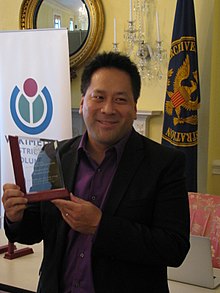Andrew Lih
American digital strategist, Wikimedian and author of The Wikipedia Revolution
Andrew Lih (simplified Chinese: 郦安治; traditional Chinese: 酈安治; pinyin: Lì Ānzhì; born 1968) is an American new media researcher, consultant and writer, as well as an authority on both Wikipedia and internet censorship in the People's Republic of China. He is currently an associate professor of journalism at American University in Washington, D.C.

Quotes
edit- Wikipedia has come a long way since it started in 2001. With around 70,000 volunteers editing in over 100 languages, it is by far the world’s most popular reference site. Its future is also uncertain. One of the biggest threats it faces is the rise of smartphones as the dominant personal computing device. ... The pool of potential Wikipedia editors could dry up as the number of mobile users keeps growing; it’s simply too hard to manipulate complex code on a tiny screen.
- Can Wikipedia Survive? (June 20, 2015), The New York Times.
- What has not suffered is fund-raising. The foundation, based in San Francisco, has a budget of roughly $60 million. How to fairly distribute resources has long been a topic of debate. How much should go to regional chapters and affiliates, or to groups devoted to non-English languages? How much should stay in the foundation to develop software, create mobile apps and maintain infrastructure? These tensions run through the community.
- Can Wikipedia Survive? (June 20, 2015), The New York Times.
- Could the pressure from mobile, and the internal tensions, tear Wikipedia apart? A world without it seems unimaginable, but consider the fate of other online communities.
- Can Wikipedia Survive? (June 20, 2015), The New York Times.
- The real challenges for Wikipedia are to resolve the governance disputes — the tensions among foundation employees, longtime editors trying to protect their prerogatives, and new volunteers trying to break in — and to design a mobile-oriented editing environment.
- Can Wikipedia Survive? (June 20, 2015), The New York Times.
- The worst scenario is an end to Wikipedia, not with a bang but with a whimper: a long, slow decline in participation, accuracy and usefulness that is not quite dramatic enough to jolt the community into making meaningful reforms. No effort in history has gotten so much information at so little cost into the hands of so many — a feat made all the more remarkable by the absence of profit and owners. In an age of Internet giants, this most selfless of websites is worth saving.
- Can Wikipedia Survive? (June 20, 2015), The New York Times.